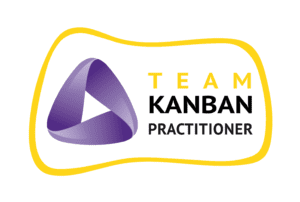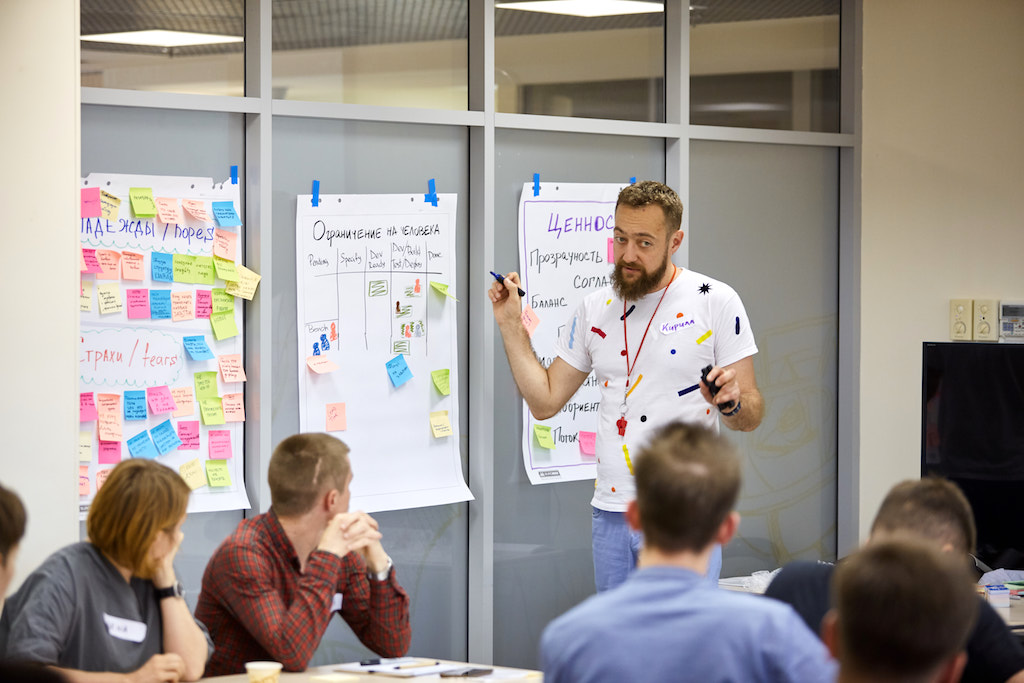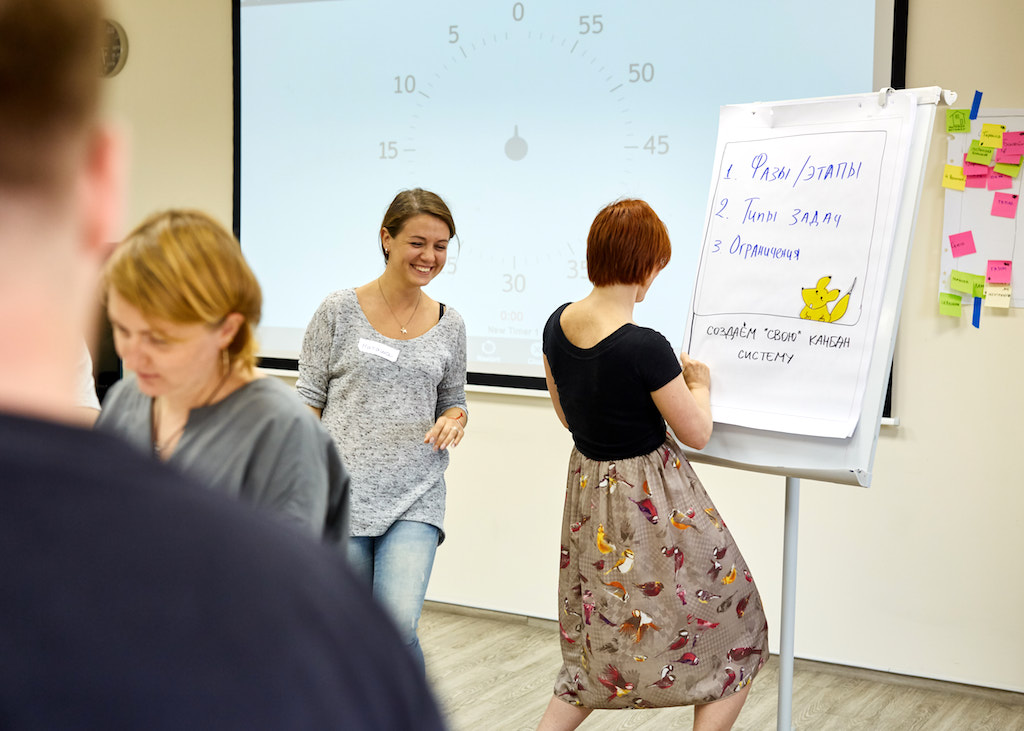 We invite you to the training course "Team Kanban Practitioner". This introductory course will enable you to start using and getting the benefits of Kanban on a team level. This course is the official training class of Kanban University, founded by David Anderson – author of the Kanban method. All participants will receive an official internationally recognized certificate of attendance from Kanban University as well as a "Team Kanban Practitioner" credential.
We invite you to the training course "Team Kanban Practitioner". This introductory course will enable you to start using and getting the benefits of Kanban on a team level. This course is the official training class of Kanban University, founded by David Anderson – author of the Kanban method. All participants will receive an official internationally recognized certificate of attendance from Kanban University as well as a "Team Kanban Practitioner" credential.
Target Audience
This program is designed for professionals who are responsible for process optimization, business performance, and project management: managers, IT directors, heads of departments, middle managers, team leaders, project managers, technical managers, engineers, and anyone who is interested in the results of the work of the various groups of people. Also, this training will be useful to ScrumMasters, who want to help their teams to get to the next level.
Training is particularly suitable for those who:
- want to understand and evaluate if Kanban is suitable for their work environment,
- wants to start working with Kanban systems and look for initial support.
In this course, we explore how Kanban systems work. We are not building a Kanban system. If you already heard about Kanban, looks like it may help you, so you want to learn more and build the system for your context – this is not the right class for you, you should go to “Kanban System Design”.
Besides that, training helps synchronize understanding of Kanban for all participants and introduces a common "language" of terms – equally understand the terms, practices, and, most importantly, the purpose of process improvement using Kanban systems.
The format of the ONLINE training
The training course program is expanded by preliminary self-training and "homework." This allows the most efficient use of time in the training sessions for discussions, and individual and group exercises.
This training incorporates many concepts of "training from the back of the room", in which the participants say and do more than the instructor: short blocks of theory alternate with practice and exercises. The program includes a simulation of the kanban system in a safe environment where all participants will be able to experience a few key aspects of the kanban system.
The course is delivered ONLINE via a series of modules of 3-4 hours duration each. The two most popular delivery schedules are listed below.
OPTION #1
(3-4 hours modules)
Week 1
Monday: Module 1
Wednesday: Module 2
Friday: Module 3
OPTION #2
(2-3 hours modules)
Week 1
Monday: Module 1
Tuesday: Module 2
Wednesday: Module 3
Thursday: Module 4
OPTION #3
(1-2 hours modules)
Week 1
Monday: Module 1
Tuesday: Module 2
Wednesday: Module 3
Thursday: Module 4
Friday: Module 5
Modules could be held in the first or second half of the day, depending on your preference (and availability, of course). Other schedule formats (than those listed above) are available upon request.
Old fashioned offline (classroom) delivery (1-day class) is possible depending on the epidemiologic situation, regulations, and travel logistics.
Few photos from one of the previous classes:
Main topics of the course
- Overview of the Kanban method
- History, principles, values
- Easy to learn simulation of Kanban system using a game
- Understanding Kanban systems
- Classes of service as a risk management approach
- Proto Kanban patterns:
- Personal Kanban
- Aggregated Personal Kanban
- Team Kanban
- Per person WIP limit
- Aggregated Team Kanban
- Constant WIP (CONWIP)
- Designing a Kanban board
- How-to set WIP limits
- Kanban cadences: meetings and reviews
- Commitment & Replenishment
Why Kanban method rather than Scrum
Kanban is an alternative path to agility. Scrum, so far, is the most widespread Agile methodology. The most common misconception about Kanban deals with oversimplification around it – "task board with limits". In fact, this is a powerful mechanism for constructing your process of delivering value to the client. Besides, the method is actively developing and evolving – a proof of the fact, the growth of Agile / Scrum teams that use Kanban from 15% to 43% (according to the latest report State of Scrum Report 2015). What is the value to the organization that Kanban of implementation brings? What are the components of the mechanism? How to use the Lean philosophy? Kanban and Scrum – which is better? And how to get the maximum benefits of the combination of both? 2-day hands-on class allows getting an answer to these and other questions and even get a hands-on experience with the principles of the method. All the participants will return from the class with the skill of designing Kanban systems.
Participants will learn to
- Simulate workflow
- Create a simple Kanban system
- Choose a frequency of the several events/meetings
-
Training reviews
Sergiy Ivashyn Analyst, Facilitator, Scientist“I'm always excited to take a class from Kirill. He trains in a very uncommon way, stimulating to think, produce insights and work closely with fellow trainees to derive solutions.
Every class from Kirill I've attended so far has contributed significantly to the way I think about professional challenges and personal life.”
-
Training reviews
Sergey Prodanov Agile Project Manager“I was lucky to attend a Kanban Management Professional courses where Kirill was a coach. That was a perfect combination of intense training course and very experienced coach.
Kirill can answer any question with practical example and detailed explanation. Also Kirill has unique ability to create an informal atmosphere explaining such a difficult and complex topics as analytics and metrics. That allowed me to absorb all that information in very easy and fast way.
I can definitely recommend Kirill as Agile and Kanban coach.”
-
Training reviews
Aleksandr Serdiukov Team Lead“I highly recommend this training to those who want most effectively and quickly master the kanban and start using it in their work.”
-
Training reviews
Viktor Sevonkaev Project Manager“I like the lack of very basic theory, which can be read in any literature, and an emphasis on practical case studies. I recommend this training to systematize the knowledge and practical games and exercises.”
-
Training reviews
Dmitry Borshchanenko ScrumMaster“This training has perfectly structured my knowledge about Kanban from different sources, and brought a lot of new ideas that I'll be implementing with the team tomorrow.”
-
Training reviews
Andrey Kuzmenko Team Lead“Loved the content of the training, the preparation of the instructor, who was ready for any question.”
-
Training reviews
Olga Avramenko QA manager“Thank you very much for the interesting and useful information. The training helped me to look at the process from the other side, expanded horizons.”
-
Training reviews
Michael Glavaskyh team leader“Quite energetic and informative training. Great initiative in a SCRUM world ;)”
What do you get out of the training
- High-quality training from the leading education provider in Kanban
- Training materials
- Membership and online profile at Kanban University
- Certificate of completion from the Kanban University
- "Team Kanban Practitioner" credential from the Kanban University
- 8 SEU (Scrum education unit) for your CSP certification from Scrum Alliance
- 8 PDU for PMI members (that could be used for prolongation of PMP and PMI-ACP certifications)
- Ability and knowledge to change your organization
Order in-house
You can order this (and any other) training class optimized for your organization and held at your premises.












